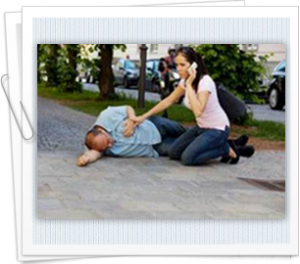Online CPR Certification Blog
Cardiac Arrest and Heart Attack
Date: July 9th, 2014
 You must have seen in some TV shows and in movies for several years or so that someone suffered from a heart attack and while the attack is ongoing, the person continuously falls to the floor and in an unconscious manner. By watching, your hypothesis is that you have witnessed a heart attack, but that was just a TV show. It isn’t real and the big one. As Fred Stanford said you never know if it’s a heart attack or a cardiac arrest isn’t it?
You must have seen in some TV shows and in movies for several years or so that someone suffered from a heart attack and while the attack is ongoing, the person continuously falls to the floor and in an unconscious manner. By watching, your hypothesis is that you have witnessed a heart attack, but that was just a TV show. It isn’t real and the big one. As Fred Stanford said you never know if it’s a heart attack or a cardiac arrest isn’t it?
The big difference between heart attack and cardiac arrest
Even if people use these medical terms interchangeably, the truth is that a heart attack is different from cardiac arrest and while a heart attack can lead to cardiac arrest, it will not flow in reverse mode. Normally, as soon as the hearts stop to beat, cardiac arrest is more instant and risky than a heart attack. This happens when the blood just stops to flow going to the heart and will show the effects dramatically. The big difference between them is that a heart attack is a circulation problem while a cardiac arrest is an electrical problem; this information came in from the American Heart Association and they want to make this clear to the public to avoid confusion.
Facts about cardiac arrest
Cardiac arrest may happen unexpectedly and it doesn’t show any warning at all. There are also no symptoms too and it can happen in an intense and extreme manner. If your companion suddenly stops breathing, suddenly pass out or there is no pulse at all, he/she might suffer from a cardiac arrest. There are around three hundred sixty thousand cases of cardiac arrest yearly and most of them happened outside the hospital while they are doing their everyday routine. In some cases, a cardiac arrest may be foreseen with exhaustion, dizziness, vomiting, chest pain, shortness of breath and blackouts. As soon as cardiac arrest occurs, the person will die in just few minutes if not given immediate medical attention. If you saw someone who fainted with no heart beat at all, it is best to call 911 for help before you administer CPR if you know how to do that.
Facts about heart attack
Every year, millions of people in the US have had heart attacks, and lots of them die because of it. With quick response you can help save lives. It’s hard to tell if a person suffers from a heart attack because the symptoms vary from one person to another. This may also be very confusing to the person, which makes it hard to recognize. Shortness of breath may be a sign and that may happen while the person is at rest or in the middle or an activity. This symptom may show alone or it may be with chest pain too. Most of the cases of heart attacks involved discomfort to the person that may last for a few minutes or it may even be longer and may be repetitive as well on different sides of the chest. The discomfort may simulate heartburn, which is very common among people with Gerd. The person may feel a pressure, pain, fullness and squeezing in the chest area. Upper body discomfort is also very common along with numbness of the arms, back, jaw, neck, shoulders and tummy. Women are prone to shortness of breath symptoms, vomiting and jaw pain than men.